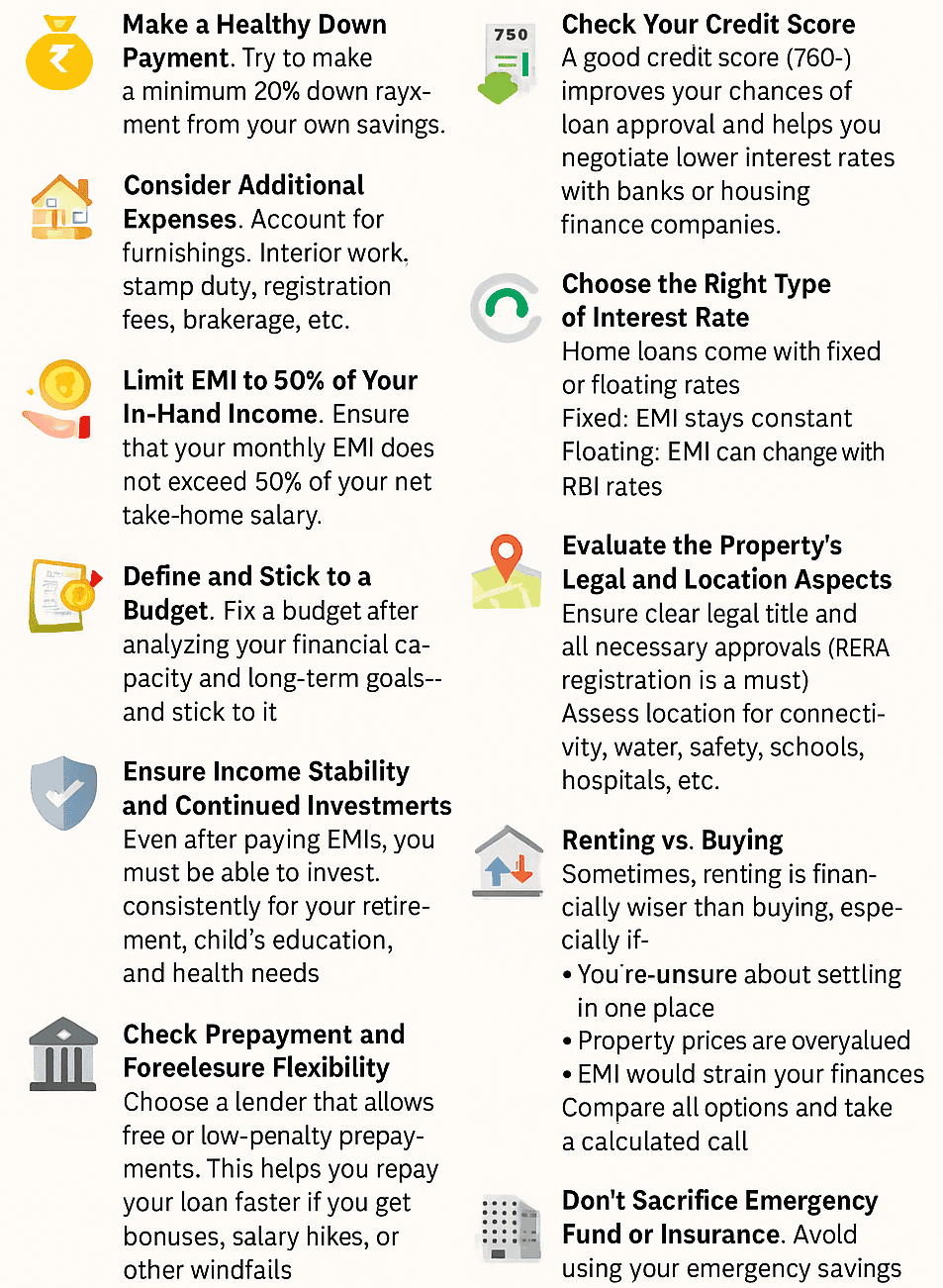Buying a home is one of the most emotionally fulfilling and financially significant decisions in life. However, without careful planning, this dream can turn into a long-term financial burden.
Whether you're a first-time buyer or upgrading to a bigger home, consider these 13 essential points before you commit to a property purchase or home loan.

1. 💰 Make a Healthy Down Payment
Try to make a minimum 20% down payment from your own savings. This reduces your loan amount, lowers your EMI, and saves you a significant amount on interest over the years.
2. 💡 Consider Additional Expenses
Your home cost isn’t limited to just the property price. Account for furnishing, interior work, stamp duty, registration fees, brokerage, and other incidental expenses.
3. 📊 Limit EMI to 50% of Your In-Hand Income
Ensure that your monthly EMI does not exceed 50% of your net take-home salary. This ensures you still have room for living expenses, savings, and emergencies.
4. 📝 Define and Stick to a Budget
Avoid falling for properties beyond your affordability. Fix a budget after analyzing your financial capacity and long-term goals—and stick to it.
5. 📈 Ensure Income Stability and Continued Investments
Buying a house should not compromise your other life goals. Even after paying EMIs, you must be able to invest consistently for your retirement, child’s education, and health needs.
6. 📉 Check Your Credit Score
A good credit score (750+) improves your chances of loan approval and helps you negotiate lower interest rates with banks or housing finance companies.
7. 🔁 Choose the Right Type of Interest Rate
Home loans come with fixed or floating rates:
Fixed: EMI stays constant
- Floating: EMI can change with RBI ratesChoose based on your comfort with interest rate fluctuations.
8. ⏳ Select an Optimal Loan Tenure
Longer tenures mean lower EMIs but higher total interest. Choose the shortest tenure possible without compromising your lifestyle or emergency preparedness.
9. 📍 Evaluate the Property's Legal and Location Aspects
Ensure clear legal title and all necessary approvals (RERA registration is a must).
Assess location for connectivity, water, safety, schools, hospitals, etc.
10. 🏦 Check Prepayment and Foreclosure Flexibility
Choose a lender that allows free or low-penalty prepayments. This helps you repay your loan faster if you get bonuses, salary hikes, or other windfalls.
11. 🏘️ Renting vs. Buying
Sometimes, renting is financially wiser than buying, especially if:
You’re unsure about settling in one place
Property prices are overvalued
- EMI would strain your financesCompare all options and take a calculated call.
12. 🛡️ Don’t Sacrifice Emergency Fund or Insurance
Avoid using your emergency savings or discontinuing insurance policies for the down payment. You need backup funds and protection against life's uncertainties.
13. 🧱 Verify Builder Credibility (Especially for Advance Payments)
If you're buying under construction or paying in advance, always check the builder's background:
Track record of timely possession
Legal disputes or project delays
- RERA compliance and customer reviewsDon’t fall for discounts or promises without due diligence.
🔚 Final Word:
"House purchase is one of the biggest financial decisions you will make. Analyse your situation carefully before making any commitment of your future income."
Take a step back, assess your financial landscape, and take informed decisions rather than emotional ones. The right planning ensures your home remains a blessing, not a burden.
💼 Need Guidance?
At PVR Advisory, we help you:
Assess affordability
Plan EMIs smartly
Compare rent vs buy
Align your home decision with other financial goals
📞 Reach out today for an unbiased opinion before committing to a home loan.



